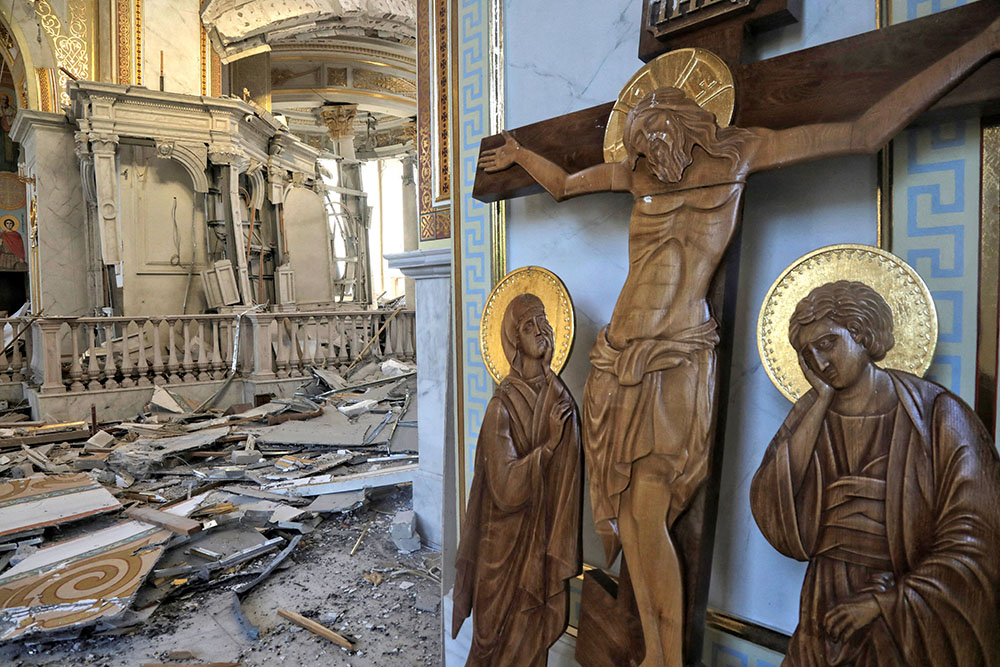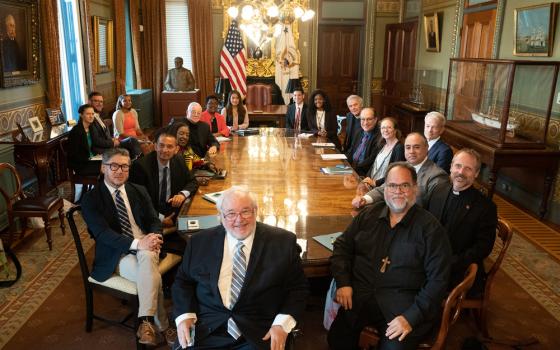
A view from beneath a baobab tree in Botswana. Palaver encounters under the baobab tree were how many precolonial African societies addressed disputes. (Wikimedia Commons/Roger Culos)
A number of recent articles have affirmed the Catholic Church's shift toward centering nonviolent strategies in its response to aggression and war. These have included essays by practitioner Anna Zaros, theologian David DeCosse and San Diego Cardinal Robert McElroy.
In her NCR article, Zaros urged Pope Francis to work towards a "just peace" ethic in the church. In his entry in NCR, DeCosse said, "The turn to Christian nonviolence within the Catholic Church should continue unceasingly." And as part of a talk at the University of Notre Dame in March 2023, McElroy argued that "comprehensive nonviolence" becomes "the central point of reference for the Church on armed conflict."
Nonviolence orients a way of being and offers a vision of the person that favors fellowship in difference. As theologians and practitioners who have worked in this field for years, we recommend that the church take a decolonial approach as it articulates a nonviolence ethic for our times.
For example, the just war tradition was articulated within an era and logic of empire. Empires conquer and occupy territories, and exploit other people's resources. They cultivate an obedient citizenry, which has played itself out through colonialism. Through violence, empires control their victims.
Over time, victims often abandon their past and embrace that worldview produced by the empire. Or victims replicate this empire's logic of domination in their response to the oppression.
A decolonial approach demands that one ask: Has the history of the nation-state political system been generally a fair one, or as constructed does it have within it the very ingredients that tend to brew destructive conflict among nations?
It would be helpful to look especially at African societies. Do they offer insights into how the nation-state paradigm is playing itself out in the continent's postcolonial context, as an instrument constructed to produce violence and to minimize cultural norms of interconnectedness?
All wars have behind them memories of perceived injustice that were not resolved adequately. An elaborate nonviolence ethic that addresses all aspects of social life must take into consideration the different factors that lead to war. Lasting peace requires a rigorous engagement with the components that produce destructive conflicts.
Advertisement
While we agree with DeCosse and McElroy that Russia's invasion and the continuing war in Ukraine provide an opportunity and challenge for Christian nonviolence, we think that it is critical to draw on a more decolonial approach for such ethical analysis. We also offer additive or alternative perspectives to DeCosse's analysis on several points.
In his essay, DeCosse also said, "Nonviolence has been powerless to stop the aggression." Yet, we know from an October 2022 report and from reports elsewhere that it has had power to impact and to reduce this aggression. We even know from direct Ukrainian testimony that in the occupied areas where nonviolent resistance was the primary method, the repression was reduced, whereas in the areas where it was primarily violent resistance, the repression increased.
If nonviolent resistance was the primary method in the overall resistance, then we'd be in a better position to assess its capability/potential to fully "stop the aggression."
In contrast, using just war reasoning, the strategy of a primary military response, i.e., armed counterterrorism approach, by Ukraine (supported by the U.K. and U.S.) has been active since 2014. Rather than "stopping" aggression or preventing and limiting war, we ended up with more escalation and aggression/war.
DeCosse also raised concerns about how our co-author Eli S. McCarthy drew on research about nonviolent resistance. He said McCarthy's approach "draws on examples more pertinent to intrastate conflict" than the Russia-Ukraine war.
However, the argument for the efficacy of nonviolence is rooted in a logic of how power works. It considers the circumstances for mapping out a strategy, but its efficacy is not predominantly determined by who is the repressive party or the methods they use.
Further, civilian-based defense in Czechoslovakia in 1968 against the Soviet invasion also gives an example of the approach having notable impact in interstate conflict. Erica Chenoweth and Maria Stephan's research in this area, which McCarthy cites, included campaigns focused on resisting occupation or seeking self-determination. These are both relevant characteristics of the protracted conflict in Ukraine as they in part seek to defend their self-determination as a nation.
A decolonial analysis helps to nuance Decosse's claim that these arguments for nonviolence are dependent on an "all-determining American imperialism."
For example, at one point he claims the sources that suggested early on in the war that Boris Johnson (and the U.S.) impacted the March 2022 peace talks, "denied they said this." Yet, the sources he provides in his article both still affirm that Johnson (or the "West") made their position against diplomacy known, even if there may have been additional reasons why Zelenskyy backed out at that stage. Acknowledging this action by Johnson doesn't deny the primary agency of Zelenskyy or Ukraine.
We wonder, even if they were "suggestions" rather than explicit demands to halt peace talks, does the fact they represent the required military resources to continue the war mean there is notable power/influence in what they recommend; and, alternatively, that they could've been and more importantly still could be much more helpful to support diplomacy?

A crucifix is seen inside Transfiguration Cathedral, which was damaged during a Russian missile strike in Odesa, Ukraine, July 23. (OSV News/Reuters/Nina Liashonok)
This seems important to more fully understand the political dimension. A decolonial analysis helps to recognize and illuminate these inquiries and possible patterns as we find a way forward today.
DeCosse also notes the brief reference to just war in the 2016 appeal of the Catholic Nonviolence Initiative, a project of Pax Christi International The issue is not simply that just war reasoning has been used to endorse war, but that it "too often ... has been used," i.e., predominantly in that way.
The issue is not whether it has ever been used correctly or a particular war seems to meet the criteria, as if one finds that case then this makes the just war reasoning conclusively valuable to maintain in the church. Even if one finds a case, war still leads to cycles of violence and generational trauma as Gerald Schlabach has argued.
Further, the primary use or impact of just war reasoning has been to legitimate war rather than prevent or limit it, including additional concerns. Recently, the Western African bishops said, "Violence does not solve any problem, not even the one that triggered it."
In turn, we would retrieve the African praxis of palaver. Palaver encounters under the baobab tree were how many precolonial African societies addressed disputes. This approach enables the community to tap into ancestral wisdom.
First, palaver praxis recognizes that all humanity participates in God's life. Second, it generates grassroots approaches to shared meanings. It is important that the Russians and Ukrainians embrace all of their complex historical memories. In the midst of war, it is critical for the citizens to initiate this with support from outsiders.
Third, a palaver ethic of nonviolence is altruistically oriented toward the common good. This means that the flourishing of oneself is always dependent on the flourishing of the other. Thus, both parties, especially Russia, have a responsibility to end the violence immediately and rebuild both nations.
Fourth, this approach is grounded in a vision of the person as relational, including both sameness and difference. This suggests a "strong" Russia needs a "strong" Ukraine. Strength is about accountability and how to support the other. This is lacking in the approach that all parties have embraced, including outsiders such as NATO.
Without addressing global systems that often favor fewer nations, a nonviolence ethic will not be able to address the deep-seated issues causing global, regional and national conflicts. A nonviolence ethic must be radically engaging in a manner that attempts to address the different forms of injustice at play in our world — racial, ethnic, linguistic, cultural, economic and political.
War is a disgrace and a failure to be authentically human. Such recognition is a palaver approach, which is a stepping stone to embracing a comprehensive nonviolence ethic.











